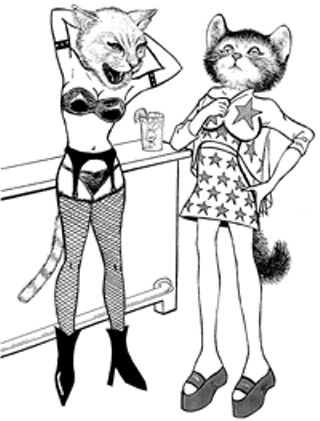Book Review: Readings
Alexa Albert
Reviewed by Dale Smith, Fri., July 6, 2001

Brothel
Mustang Ranch and Its Womenby Alexa Albert, M.D.
Random House, 271 pp., $24.95
There are highways outside Nevada towns and cities that lead to the nation's only legal brothels, with names like the Chicken Ranch in Pahrump, the Pussycat Saloon in Winnemucca, and the Moonlite Bunny Ranch outside Carson City. In 1999, Joe Conforte, the sex broker largely responsible for the legalization of brothel prostitution, was forced to close the state's largest and most profitable cathouse, Mustang Ranch, when he was convicted of siphoning money to Brazil where today he lives in fugitive exile. On its final business day, as workers rushed last-minute tricks before IRS and other federal agents could padlock its doors, a Harvard medical student was among the sex workers, bartenders, and other employees forced to leave the legendary establishment.
Alexa Albert first visited Mustang Ranch in 1992 to study condom use among female prostitutes in Nevada brothels. She lived there for a month, sharing meals and conversation with women whose contracts required them to stay weeks at a time within compound gates. Initially, 41 women participated in the study, delivering used customer condoms to her for examination. But what began as an investigation of prophylactic practices grew into a broader personal study of legal brothel prostitution. In the years following her initial study, Albert continued to visit Mustang Ranch, living there off and on for seven months. By doing so, she observed the personal challenges and professional pressures facing sex workers in an industry of intimate and contradictory demands. Her goal was not to redeem brothel prostitutes, "but to awaken readers to their humanity and bring this issue out of the realm of caricature and into that of serious debate."
Brothel presents a complex and diverse market whose products include more than just sex. From prostitutes, their husbands and boyfriends, floor maids, managers, and customers, Albert discovers the personal motivations that fuel this tabooed business. Winning confidence from sex workers who are often secretive of their profession, she extends with care and sympathy a lifestyle that is difficult and demanding, but ultimately safer and more rewarding than the illegal alternatives found on streets across America. While living at Mustang Ranch she observed interactions of prostitutes and their clientele to gain knowledge of brothel negotiations, worker motivations, and client expectations. She details the lucrative rewards and disadvantages of the system too, where the house takes half the cut, plus room and board. Legalization, Albert finds, doesn't include legitimization, and the sex service in Nevada lacks the same privilege and prestige associated with other professions in a state that presents itself with confident amorality.
Surprising herself on two occasions, Albert observes sessions between prostitutes and their clients. She does not physically participate in these intimate transactions, but Eros and economy hook up through her Ivy League presence for a rare exchange. Grudgingly sympathetic to the men who frequent brothels, her minor consideration of their need prevents a deeper investigation of the ponderous psychic and physical urges that create this unique market in the first place. "I saw Norman lying naked on the bed like a beached whale," she writes with hard cliché of one session. "I couldn't fathom how Brittany could ever pretend to be attracted to this man." Money, of course, mediates that exchange, for after all, she says, "A trick is to be tricked."
In the end, Brothel makes a compelling case for legalized prostitution. Nevada's brothels remain HIV-free, and women feel safer working in them than alone on city streets. Despite long hours and house rules stacked in favor of brothel owners, the women take a great deal of pride in their work. "In a business rich in tricks of the trade," Albert writes, "it's easy to be deceived by our assumptions and, in doing so, overlook the humanity that's at the core of this complex and timeless profession." The myth and mystery she spotlights may not need humanity's claims for it, but the narrative remains humanly provocative nonetheless.








